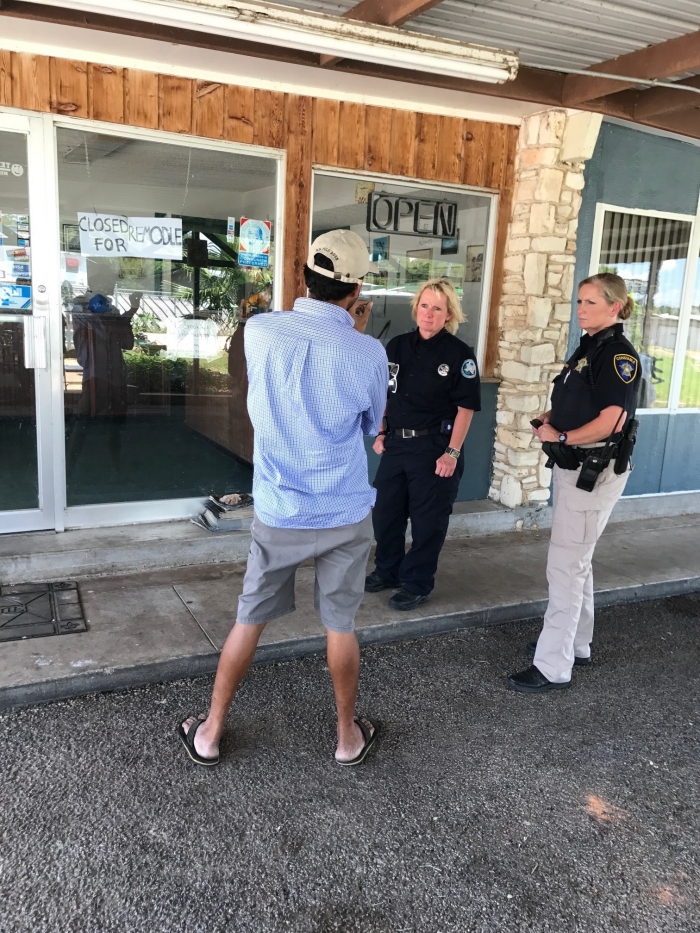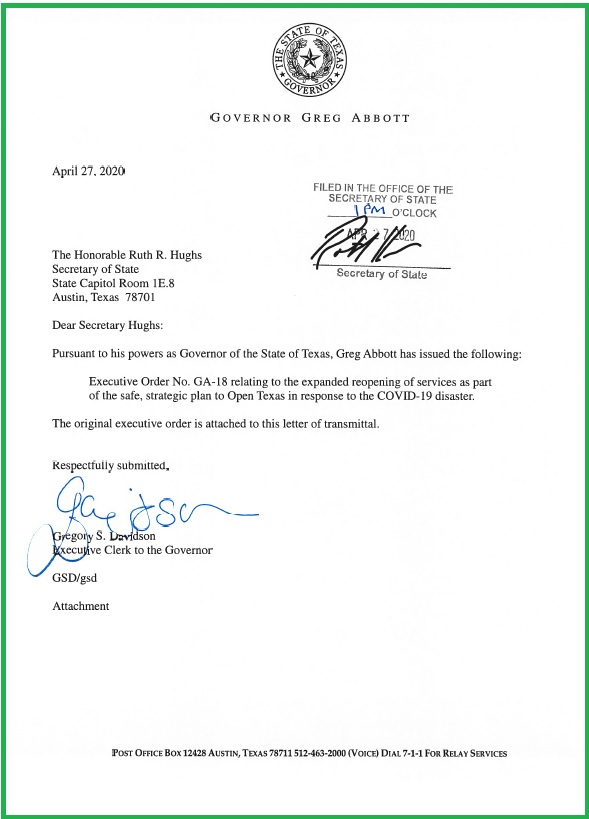Kingsland motel closed by state fire marshal

Burnet County Precinct 1 Constable Missy Bindseil, right, and State Fire Marshal Investigator Moe Jones talk with the manager of the LBJ Motel in Kingsland after posting an order to vacate the establishment until repairs for safety can be made. Bindseil first received dumping complaints about the area and she and Precinct 1 Constable Leslie Ray, not pictured, took safety concerns to the state.
By Glynis Crawford Smith
The Highlander
A Kingsland motel has been declared “uninhabitable” by the Texas State Fire Marshal and tenants have been barred from staying there unless or until repairs have been made.
State and local officials converged on the LBJ Motel at 13813 Ranch to Market Road 1431 about 11 a.m. Monday, June 5, to investigate.
“Essentially there had been a lot of complaints about the motel, about loose wiring and other things,” said Burnet County Sheriff Calvin Boyd on Tuesday. “The state fire marshal said the people there could stay the night, but they had to be out by 8 a.m. this morning.”
The official notice was posted on the door of the motel office at a little after 2:30 p.m. Tuesday.
Numerous health and safety complaints were conveyed to the state by Burnet County Precinct 1 Constable Leslie Ray and Precinct 4 Constable Missy Bindseil. They and officers from the Burnet County Sheriff's Office (BCSO) went to the motel with State Fire Marshal's Office officials about 11 a.m. Monday.
Ray said he had received complaints about the motel since January.
“At first they were environmental in nature, trash and maintenance,” he said. “Mrs. Bindseil had received complaints, too, and we began talking about it four or five weeks ago. We went out and looked it over and found unsafe conditions and sent pictures to the state marshal's office.”
“Agencies conducted the investigation/inspection of approximately 23 rooms … which revealed more health and fire safety concerns than initially discovered,” said a press release from the BCSO. “The State Fire Marshal’s office ordered a mandatory vacate order for all residents of the establishment until the identified problems are corrected and fixed.”
Approximately 15 rooms were occupied at the time of the order, the sheriff said. Although they pay a daily rate, he agreed some stayed in the motel on a permanent basis.
The Burnet County Sheriff’s Office Victims Services coordinator is working with the tenants to find additional housing, Boyd said.
“The main concern is for the safety, security and welfare of all the tenants that occupy the location, as well as, the surrounding properties and home owners in the area,” said the sheriff's press release.
Kingsland is unincorporated, so no city ordinances control health and safety of the community. While most of the development there lies in Llano County, the LBJ Motel is in the area west of the Colorado River Bridge in Burnet County.
The State Fire Marshal's Office is a division of the Texas Department of Insurance with the stated goal of to reducing the incidence and severity of fires and the deaths they cause. The office can be called in anywhere in the state.
The order specifies that the state fire marshal has determined that “dangerous conditions exist because the premises are susceptible to fire, that a dangerous condition is created by the improper maintenance of electrical wiring and appliances, inadequate egress or escape means and other dangerous conditions liable to cause or promote fire or create danger for fire fighters, occupants or other buildings or structures.”
It said also that the state office had been contacted May 18 and conducted the inspection May 5 that led to the Order for Correction of Dangerous Conditions and Remedial Action June 5.
“Inspectors secured consent from the manager, identified as Mr. Pinakin (Pino) Rameshbhai Bhakta to examine the premises.”
It listed such circumstances as exterior padlocks that would allow occupants to be locked inside rooms, multiple instances of exposed wiring, a main electrical shut off unfastened from the wall, the condition of the smoke alarms and fire extinguishers that were padlocked behind non-safety glass, with no means to break the glass.
In all the conditions violated the NFPA Fire Code and proof of repairs would be required to resume use of the building.






